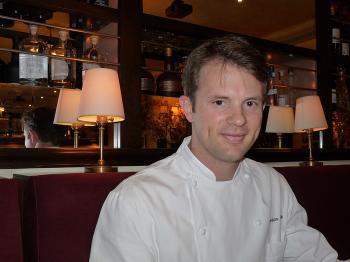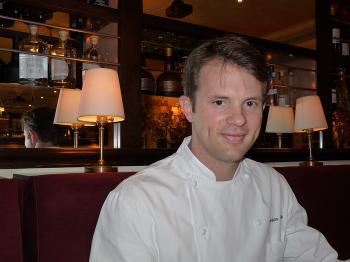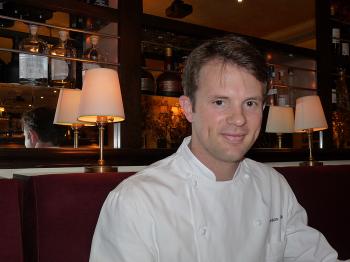On this day I sat with the chef of Cognac, a French brasserie in Manhattan. My first question to chef Florian V. Hugo was if he was related to one of France’s greatest poet, play writer, and novelist, Victor Hugo, to which he replied that, indeed, he was. He is a fifth generation of the Hugo family.
Hugo told me that he comes from a family of artists and poets. His father, a talented goldsmith, had special relationship with the contemporary artists like Picasso and Andre Doran designing jewelry and medallions.
Hugo said, “Until the age of 12, I [thought I] was going to fall into father’s steps.” Later, however, he found himself on a different path. As he grew older, and with an intellectual mother, Hugo wanted to be a diplomat and went to study political science and economics but that was not to be. “I love the creation of ceremonial dinners. I love food and I love to eat,” he told me with a childlike and innocent smile.
Hugo’s formal culinary education began with six months study and six months of internship at Ecole des Arts Culinaires et de l’Hotellerie, Ecully in Lyon. He then went to work in Paris, Monaco, and London. His last stop was Denver working in a French bistro prior to being at Cognac. His extensive training and significant knowledge comes from the rigorous training of French techniques. He said that each apprentice has to endure to a relatively great amount of suffering during training, where hierarchy is a regimented policy.
Cooking as a profession is taken very seriously in France, and he trained under two legends, Paul Bocuse and Alain Ducasse. His best and most rewarded suffering being the eight years of training with Ducasse, Hugo said, “It was good suffering and the best training you can have.”
Chef Hugo believes that knowledge of French cooking heritage is a blend of classic techniques and old-fashioned innovation, “Everything starts with a technique in the kitchen. Then the why’s, ‘Why do I peel this way?’”
One of the many challenges he faces in the kitchen is the training and the transfer of knowledge to a diverse ethnic staff and how to explain to them his vision of taste. “Here I have to be a diplomat and be flexible to get a point across,” he says. Hugo wants to bring a sense of authenticity. “We want everybody to be happy and want to make this food available to everybody to enjoy. Tastes do not lie.” It is something that stays in your mouth. Everything is fresh. Bread is baked every three hours in Cognac’s bakery adjacent to the dining room.






